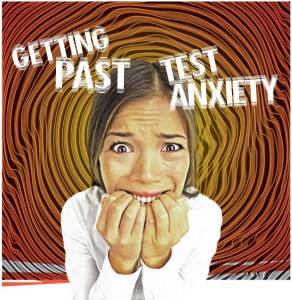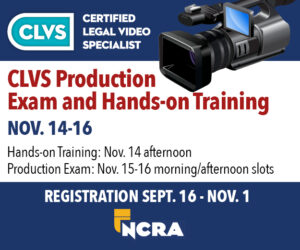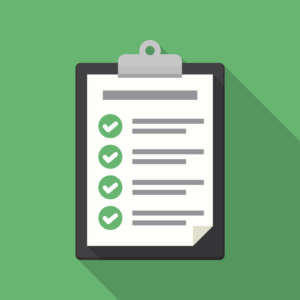By Marybeth Everhart, RPR, CRI, CPE
 According to Wikipedia, test anxiety is “a combination of physiological over-arousal, tension, and somatic symptoms, along with worry, dread, fear of failure, and catastrophizing that occurs before or during test situations. It is a physiological condition in which people experience extreme stress, anxiety, and dis-comfort during and/or before taking a test.” Further, “test anxiety can also be labeled as anticipatory anxiety, situational anxiety, or evaluation anxiety.
According to Wikipedia, test anxiety is “a combination of physiological over-arousal, tension, and somatic symptoms, along with worry, dread, fear of failure, and catastrophizing that occurs before or during test situations. It is a physiological condition in which people experience extreme stress, anxiety, and dis-comfort during and/or before taking a test.” Further, “test anxiety can also be labeled as anticipatory anxiety, situational anxiety, or evaluation anxiety.
Some anxiety is normal and often helpful to stay mentally and physically alert. When one experiences too much anxiety, however, it can result in emotional or physical distress, difficulty concentrating, and emotional worry” (Wikipedia, 2014).
Wow, that’s pretty scary stuff! Does this sound like you on test day, whether in school or taking a skills test? Your brain takes over, scares your body half to death, and suddenly you’re paralyzed. You can’t remember where to put your fingers, how to use that machine in front of you, or even when and how to breathe!
What’s interesting about test anxiety is that it is a learned behavior. We aren’t born afraid of testing or fearful of a sub-par performance on an exam. Rather, we acquire this response from those around us, much like we learned to speak and act in various situations — we follow the example set by others. Can you recall a time in your life when someone you admired demonstrated a fear or anxiety over a test or upcoming event? Even comments or well-intended encouragement from our parents or another authority figure at a young age can cause an undesirable response to certain events, such as a test. Do you remember how stressful the SATs or ACTs were when you were in high school? Do you think that stress was self-imposed, generated by outside sources, or perhaps a little of both?
The good news here is that we can unlearn this behavior — this frightening, incapacitating reaction we have toward skills tests. Overcoming test anxiety will take some time and effort, but you’re already putting in time and effort preparing for those skills tests, right? So, let’s look at what things you can incorporate into your practice sessions that will help you tame the test anxiety beast.
To understand how to modify your approach to testing, let’s first take a basic human physiology lesson. Your brain is made up of neural pathways on which information travels to other parts of your brain and body. Much like a hike in the woods, the first time or two that you use a path or blaze a new trail, the going may be slow while you remove obstacles from your way. But the more you walk that path, the more trampled down the trail becomes, the wider it is, the easier the walk, and the more people can use the same trail. In other words, you widen and strengthen that trail, just as you widen and strengthen a neural pathway.
Each and every time you react negatively to a test or think a negative thought about an exam, you widen and strengthen the negative neural pathway related to testing, and your brain uses that neural pathway to send negative messages to the rest of your body. You tighten up, take a breath, and hold it. Your hands begin to sweat and shake, and you tell yourself you’re not ready for this. In essence, you have created a self-fulfilling prophecy. To modify your outcome, you must first forge new pathways and create new testing habits. Let’s take a five-step approach:
1. Focus on the positive.
I’ve written and spoken on the importance of “Ready, begin” a number of times, but it’s worth repeating. As you no doubt are aware, every NCRA certification exam starts with that phrase, so let’s begin to think positively about that phrase. When you are practicing, repeat something positive after those words — something like “I rock!” or “I’m ready!” or “Let’s begin!” Whatever positive phrase or phrases you wish to use are entirely up to you, but keep it short and, of course, positive. Neural pathways in your brain can actually be altered by simply changing your verbal or mental response to a stimuli, such as the phrase “Ready, begin.” Modify your response from a negative to a positive one.
2. Change your focus.
Instead of asking yourself, “What happens if I don’t pass this certification?” ask yourself, “What happens when I do pass this certification?” Remind yourself of all the positives associated with a new certification — finally getting that job as a new reporter, receiving an increase in pay for a realtime certification, appreciating the recognition associated with additional letters behind your name. There are many positives to attaining a new certification, so focus on those positives and not the negatives that may result if you do not pass the test. Change the “if” to a “when” — not “if I don’t pass” but “when I do pass.”
3. Use your imagination! You can form new neural pathways not only by doing, but also by envisioning; so imagine yourself remaining cool, calm, and collected throughout your next certification exam or speed test. Begin every day by visualizing that event, and even see yourself receiving the good news from NCRA. Imagine hanging your framed certificate on the wall and posting all about it on Facebook and LinkedIn. After all, your friends and colleagues want to share in your good news, too! Use other’s positive outcomes to boost your own — after all, if your friends can do it, so can you.
4. Create a plan. Decide how you will handle those negative thoughts when they enter your mind, and practice that plan. When preparing for a test, practice those negative thoughts and also practice your plan to eliminate them. If you hear “Ready, begin” and your response is, “I’m not ready, please don’t begin!” then you need to stop, repeat your positive phrase, and start your practice session again. Remember, there are two parts to certification exams: your skills and your confidence! A lack of confidence can outweigh and overwhelm your skills every time. If you don’t believe you can pass the test, then you never will pass it, regardless of how good a writer you are.
What if you blow a test each time you say to yourself, “I’m getting this!”? Then practice that. In each and every practice session, say that phrase to yourself and then push your-self to continue “getting it.” Ultimately, the new neural pathway will be just that: You continue to get it as opposed to falling apart when you tell yourself you’re getting it. In other words, try to replicate your testing anxiety as much as possible in your practice sessions so you can create a new response to the negativity, form a new habit, and generate a new neural pathway.
5. Get your mind in a place of possibilities.
Review your practice and testing patterns. What obstacles are in the way of you reaching your goal? How can you modify or remove those obstacles? If you can’t practice effectively at home because your spouse and kids want your undivided attention, then leave the house 30 minutes early and practice at Starbucks on your way work, or stop at the library for 30 minutes on your way home. In other words, remove the obstacles rather than letting the obstacles dictate the outcome. And keep in mind that, as a working reporter, all you need to improve your skills is 15 minutes of quality practice a day.
Many of us have heard the popular motto: “You must be the change you wish to see in the world.” Let’s modify that a bit and say, “You must be the change you wish to see in yourself.” Ready, begin. . .
Test-taking tips:
- Get a good night’s sleep the night before.
- Eat a light, healthy breakfast. Stress causes your cortisol levels to rise, and cortisol causes food cravings, often for those sugary carbs. While yummy, those sugary carbs can result in a sudden drop in blood sugar levels. Your chances of passing can plunge right along with your blood sugar.
- Here are some foods that help fight stress: Oatmeal, oranges, nuts, berries, avocado, asparagus, green tea, and chamomile tea. Trying freezing berries — blueberries and raspberries freeze well — the night before and take them with you to munch on.
- Limit your caffeine on test day. Save your venti latte as a treat for after the exam.
- Arrive early, get a good seat, and focus on positive thoughts.
- Put your headphones on and practice quietly. Remember, this is not a social event. Plan to meet your friends and colleagues after the test is over when you have time to chat. It’s hard to remain calm and positive when those around you are anything but! Again, don’t let others dictate your outcome.
Marybeth Everhart, RPR, CRI, CPE, is a freelance reporter. She is also the national marketing manager for Realtime Coach. She can be reached at meverhart@learnrealtime.com.



